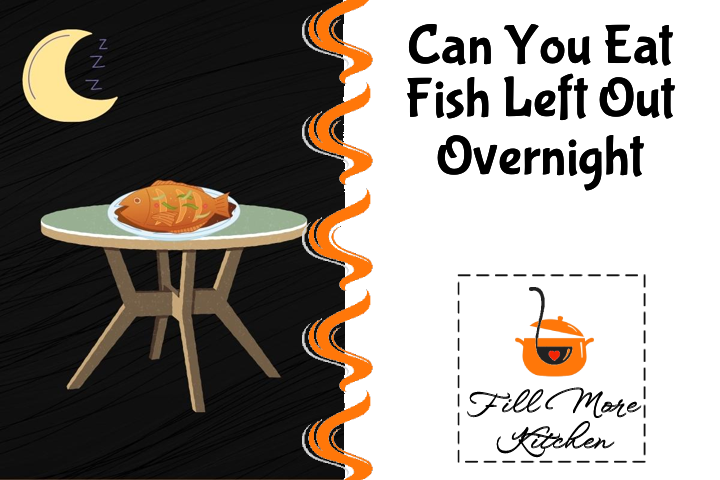As summer draws near, you might be transitioning your eating habits from heavy soups and comfort food to lighter, more refreshing meals.
Although fish can be consumed in various ways throughout the year, there is nothing quite like savoring a grilled fish fillet in a beautiful outdoor setting.
Knowing how to store leftover fish is important whether you are cooking it on the grill or in the oven.
It is not recommended to consume fish that has been kept at room temperature for over two hours as all perishable cooked foods enter the “danger zone” for bacterial growth after this time. Fish with high unsaturated fats, such as salmon and rainbow trout, should be refrigerated even earlier due to quicker spoilage.
Although there may be some flexibility in the rule for cooked foods without meat or different room temperatures, it is essential to follow the two-hour guideline when handling seafood, whether it is cooked or raw.
Don’t be alarmed, as I am here to provide you with all the necessary information regarding the correct storage of fish and the rationale behind avoiding leaving it out overnight.
What Happens When Fish Is Left at Room Temperature?
As long as fish is freshly cooked and hot, it is safe to consume at room temperature, but once its internal temperature falls below 140 degrees Fahrenheit, it becomes a favorable environment for bacteria to thrive.
When it comes to raw fish (and other types of seafood), it is crucial to store them in the refrigerator as soon as possible, unless you plan on cooking them right away.
It is recommended to avoid thawing fish at room temperature and instead safely transfer frozen fish into the refrigerator a day or two prior to use.
If you have purchased fresh, uncooked fish, it is essential to refrigerate it immediately. Similarly, if there are any remaining pieces of cooked fish after a cookout that no one is consuming, it is advisable to transfer them to the fridge as soon as possible.
What Can Happen If You Eat Fish Left Out?
Whether or not it is safe to consume fish that has been left out overnight is contingent upon various factors, including differences in individuals’ immune and digestive systems.
Consuming cooked fish that has been left out overnight can be dangerous, but it may not have any adverse effects on some individuals. As long as the fish does not emit a foul odor or taste strange, people with robust digestive systems and no underlying health problems may still consume it safely.
Consuming fish that has been left at room temperature for an extended period can be dangerous for individuals with a weak immune system or sensitive stomachs, and it is recommended to avoid consuming fish that has been left out for more than two hours, regardless of your category.
Consuming fish that has been left out for a few hours and has accumulated bacteria can result in severe symptoms such as nausea, stomach cramps, headaches, vomiting, Vibrio infection, Salmonella, and in some instances, even death.
Other factors also affect the safety of leaving fish out, such as the environment in which it is left. If the fish is left out during summer or in a warm location, the risk increases significantly.
Although a cool room or air conditioning may slow down bacterial growth, it cannot substitute for the effectiveness of a refrigerator in preserving fish that has been left out overnight.
There are various factors that determine whether or not you will get sick from consuming food that has been left out, and it is difficult to predict the outcome based on appearance and odor alone.
It can be frustrating to have to discard fish that has been left out accidentally, considering it is an expensive source of protein. However, it is essential to prioritize your health over a few dollars and use your discretion when deciding whether or not to consume it.
How Can You Tell If Fish Left Out Has Gone Bad?
Identifying whether food has gone bad can be challenging, and it’s easy to feel uncertain about the right course of action. However, there are several indicators that can help you determine if your fish is no longer safe to eat.
1. It Smells (But not like fish usually does)
Identifying the smell of fish is one of the simplest ways to determine if it has spoiled, as it has a potent and unique aroma that may be unpleasant to some individuals, but any noticeable alterations should be detectable even if you are not fond of its scent.
If fish is spoiled, it will emit a strong odor similar to ammonia and have a musty smell that is 100 times stronger than the usual scent of water. If you are already sensitive to the smell of fish, you may find it difficult to tolerate.
2. It Has Changed Color
Inspecting the fish visually is another method to determine if it has gone bad; any alterations in the color of the meat or scales could indicate spoilage.
3. It Looks Unusually Oily
When raw fish is nearing complete spoilage, it will develop a milky and glossy appearance.
4. It’s Very Slimy
Once fish has gone bad, whether it is raw or cooked, it will develop a slimy texture and become mushy to the touch; therefore, if you observe any of these indications, it may be necessary to dispose of the fish before it starts to decompose.
How You Should Store Fish
Raw fish should not be stored in a sealed container in the refrigerator as it can easily rot and deteriorate, even if it has only been left overnight.
It is important to ensure that your hands are properly washed before handling fish to prevent the spread of bacteria. Afterwards, rinse the fish in cold water and use a clean cloth to dry it before storing.
To store fish, place it in a large, gallon zip lock bag in a single layer and then put the bags on top of an ice tray. Make sure to add extra ice on top of the fish to maintain its cold temperature.
It is possible to cover your fish with parchment paper, plastic wrap, or aluminum foil to ensure it is fully enclosed and there is no space for air to circulate.
If you want to store fish for a longer period, freezing is an option. The process involves cleaning the fish as you would for refrigeration and placing it in a Ziploc bag. Before sealing the bag, ensure that all air is removed. Additionally, you can choose to wrap the fish in parchment paper or aluminum foil before placing it in the bag.
How Long Can Fish Be Stored?
Raw fish and seafood can be refrigerated at or below 40 degrees Fahrenheit or 4.4 degrees Celsius for up to two days to maintain its optimal quality, while cooked fish can be stored in the refrigerator for three to four days.
It is important to either eat or dispose of fish and seafood stored in the refrigerator to avoid a foul odor caused by spoilage.
Depending on the fish type, you can freeze uncooked fish for 3 to 12 months, while cooked fish can last up to 3 months in the freezer. However, the taste and texture of the fish may alter as you store it for a longer period.
You can also check this video about “Can You Eat Fish Left Out Overnight?”
Check out our 10 reviews!
Related posts
https://fillmorekitchen.com/can-you-eat-mac-and-cheese-left-out-overnight/
https://fillmorekitchen.com/can-you-put-an-oven-pan-on-the-grill/
https://fillmorekitchen.com/can-you-add-a-third-rack-to-a-dishwasher/
https://fillmorekitchen.com/is-there-milk-in-dark-chocolate/
https://fillmorekitchen.com/what-size-sous-vide-container-should-i-buy/



